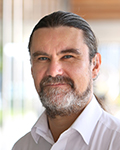The University of Nottingham excels in all the ELT metrics: It features in the QS international rankings for both Linguistics and Education as it does in the UK’s Research Excellence Framework. It also did well in the Teaching Excellence Framework. The MA TESOL is in the School of Education alongside the Centre for English Language Education, which is an EL Gazette Centre of Excellence.
We asked Paul Knight, who heads up the MA TESOL what makes Nottingham different?
I originally joined the University of Nottingham as part of the team establishing our campus in Ningbo, China and the international perspective of the university was something that really struck me, it has a huge impact on our TESOL provision. We have a campus in Semenyih, near Lumpur, Malaysia as well.
Our MA TESOL is offered at each of our campuses and globally online. I think this global perspective is a key element in our success. Our team here in the UK is international in its make up, and that also provides a welcome global perspective on our work.
I think that with practitioner focussed courses like ours, it is important that those delivering the courses have an understanding of the different professional contexts our students come from, and at Nottingham we have that. TESOL staff at each of our campuses liaise to ensure that course content not only reflects the latest theoretical developments but relates to the teaching contexts of our students. We even have a number of global routes that can allow cross-campus and combined face-to-face and online study towards an MA.
Nottingham is also quite different in the way it differentiates between its MA TESOL and its MA in Applied Linguistics, as Paul explains.
We realise that students come to study with us for a variety of reasons and with a variety of planned career paths. While some are drawn out of a general interest in applied linguistics, others have a very clear focus on language education. The organisation of Nottingham’s provision reflects that, and we consciously aim our MA TESOL, and our MA in Teaching Chinese to Speakers of Other Languages, at language teachers who seek to further their careers. This is reflected in our offering a pair of core modules that every student must take, which we feel provide the foundation every student needs. These are focused on methodology and curriculum, and understanding language learning and the language learner.
After the core modules we offer specialist electives, covering areas like Assessment, or Young Learners, that students can choose to match their own professional interests. Teaching young learners has been increasingly popular, and since Covid, interest in technology and language education has increased a lot.
When designing the programme, we felt that every graduate needed a solid grounding in how we believe languages are learnt and how we believe they should be taught, so we designed these modules to look at areas of psycholinguistics and SLA on the one hand, and the development of language teaching methodology on the other. We feel that this gives a strong foundation for students to build on when they choose their own, more specialised, electives. Interestingly, data we have recently collected to help us ensure our programmes meet our students’ needs reveals that both alumni and employers agree that this is good choice.
Nottingham offers a range of options of professional areas. Why do they feel that professional focus, rather than, say, theory is so important?
We certainly don’t ignore theory; all our modules establish a strong theoretical foundation, but we know that our students are professionals who will need to apply what they learn with us in their professional contexts. Making the link between theory and real-world educational contexts is our aim, and students are always encouraged to consider the relevance of what they are studying to their own contexts.
Will this work for me? Does this match my experience? Are the two questions we always encourage students to ask. Hearing from our alumni about how their studies have enhanced their subsequent practice is one of the great rewards of my job!
We asked Paul if he had three wishes what would they be and why?
I think one word covers it: impact! We like to think that through our work on the course and through our research that we have a real-world impact and improve foreign language learning globally by producing the next generation of ELT professionals. And personally, I’d like to feel that my work has contributed to this. So, having a bigger impact would be my wish!

Paul Knight works at the University of Nottingham, UK, where he is Course Leader for the MA TESOL. Prior to this, he worked at the University of Nottingham’s Ningbo, China campus, where he led and helped establish the Centre for English Language Education. He has also worked at the UK’s Open University, where he helped launch their first online MA TESOL.





